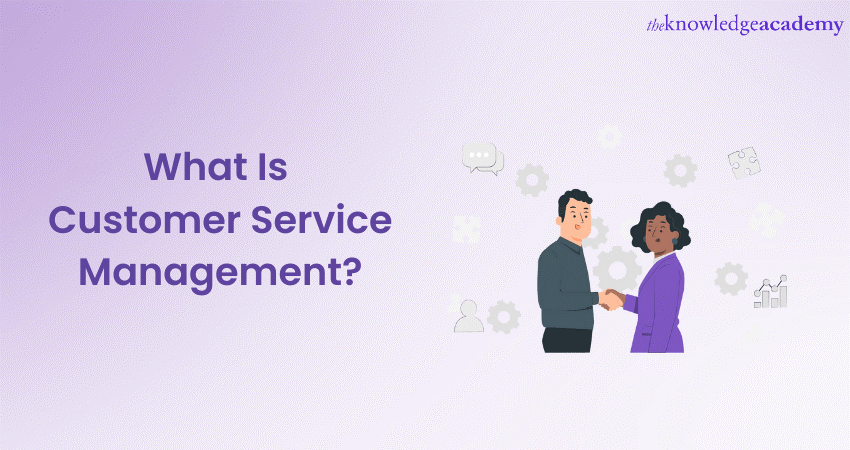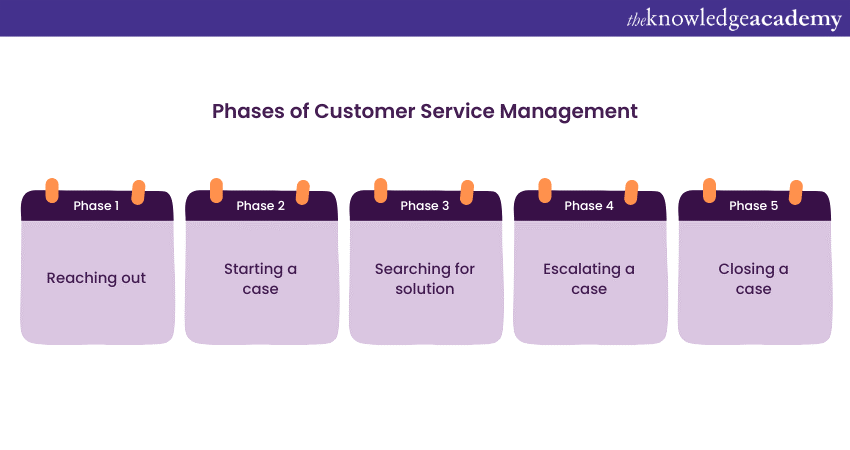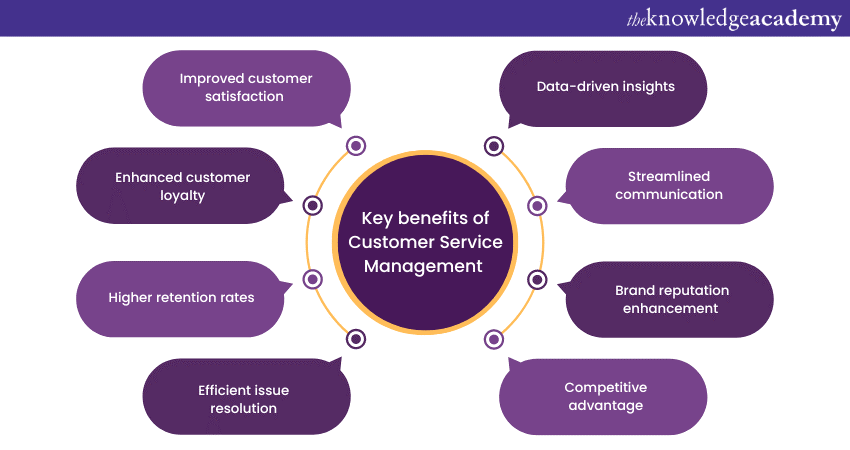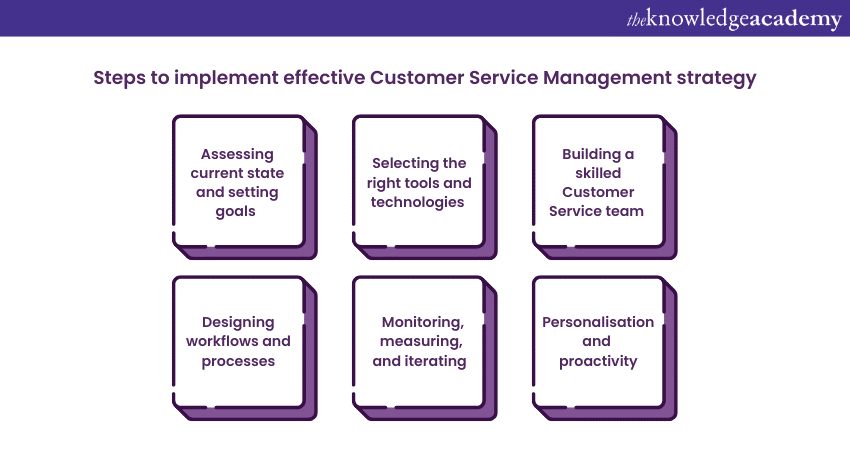We may not have the course you’re looking for. If you enquire or give us a call on +420 210012971 and speak to our training experts, we may still be able to help with your training requirements.
Training Outcomes Within Your Budget!
We ensure quality, budget-alignment, and timely delivery by our expert instructors.

In modern business, ensuring customer satisfaction is the key to success. Companies prioritising exceptional Customer Service are likelier to thrive in competitive markets. This is where Customer Service Management (CSM) steps in. But do you know What is Customer Service Management and how it can help your organisation deliver exceptional services?
According to Statista, revenue in the Customer Service Management market will reach 3 billion GBP in 2023. If you want to gain insights about CSM, you are in the right place. In this blog, we will focus on What is Customer Service Management and how it can help companies offer optimum support in all customer interactions.
Table of Contents
1) An Introduction to Customer Service Management
2) Why is Customer Service Management important?
3) Key benefits of Customer Service Management
4) Implementing an effective Customer Service Management Strategy
5) Conclusion
An Introduction to Customer Service Management
Customer Service Management is a strategic approach that businesses adopt to ensure exceptional customer experiences throughout their journey with a company. At its core, CSM encompasses a range of strategies, processes, and technologies designed to effectively handle customer interactions, address their concerns, and enhance overall satisfaction. CSM encompasses various phases that include performing the following:

Moreover, CSM aims to create a seamless and positive customer experience from the moment a potential customer contacts a company through the purchase process and even post-purchase support. It involves setting up robust communication channels, providing timely assistance, and resolving issues efficiently.
It is not just a reactive process; it involves proactive measures to understand customer needs and preferences, thereby allowing businesses to tailor their offerings and services accordingly. This can involve collecting and analysing customer feedback, utilising data-driven insights, and adapting to changing customer expectations.
Key Benefits of Customer Service Management
Customer Service Management goes beyond the traditional customer support practices. It involves a complete approach that affects all aspects of a company's activities. Let's explore the key benefits of CSM and how they collectively contribute to business success and customer satisfaction:

Improved customer satisfaction
Customer satisfaction is crucial for business success. Customer Service Management aims to ensure every interaction is satisfying, respectful, and valuable for the customer. Let's explore how it can help:
1) Build trust: CSM swiftly meets customer needs, creating positive experiences and trust.
2) Foster loyalty: It fosters long-term relationships, leading to loyalty and recommendations.
3) Ensure happiness: CSM focuses on making customers happy and valued throughout their journey with the company.
Enhanced customer loyalty
Elevating customer loyalty is pivotal for businesses. CSM plays a crucial role in achieving this goal by delivering consistent, reliable, and personalised service. Let’s explore how it can help:
1) Strengthen emotional bonds: CSM builds strong emotional connections between customers and the brand.
2) Deliver consistent service: It provides consistent, reliable, and personalised service that resonates with customers.
3) Create brand advocates: CSM turns loyal customers into brand advocates who share positive experiences and attract new customers.
4) Reduces price sensitivity: Customer loyalty reduces price sensitivity, increases repeat purchases and improves brand performance.
Higher retention rates
Maintaining customers is vital for sustained success. Customer Service Management improves retention rates by keeping customers engaged, satisfied, and loyal. Here's how:
1) Value-added service: It provides value-added services and solutions.
2) Efficient issue resolution: CSM ensures efficient issue resolution.
3) Consistency matters: Maintaining consistent and favourable interactions keeps customers coming back.
4) Numerous advantages: Higher retention rates offer several advantages, including lower customer acquisition costs and increased customer lifetime value.
Efficient issue resolution
Efficient issue resolution is essential for maintaining customer satisfaction and trust. Customer Service Management excels in this aspect by providing fast and effective solutions. Here's how it can help with issue resolution:
1) Customer-centric approach: CSM involves listening to customers, understands their issues, and offers the best possible solutions.
2) Confirm satisfaction: It involves following up with customers, confirms their satisfaction, and solicits feedback.
3) Vital for success: Efficient issue resolution enhances customer satisfaction, trust, and loyalty, ultimately contributing to business success.
Data-driven insights
Data-driven insights are the foundation of modern Customer Service Management. These insights lead to better customer understanding and informed decision-making. Here's how it can help:
1) Understand your customers: By analysing customer data, businesses gain valuable insights into customer behaviour.
2) Tailor your approach: These insights help tailor products, messages, and support to meet customer needs and expectations.
3) Predict and prevent: Predict future actions and prevent potential issues.
4) Enhance personalisation: Data-driven insights can help personalise customer interactions and recommend relevant products or services.
5) Drive strategic decisions: Data-driven insights inform strategic decisions, including improving marketing campaigns and finding growth opportunities.
Streamlined communication
Effective communication is essential for providing a positive customer experience. Customer Service Management focuses on creating clear, consistent, and efficient interactions with customers. Here's how you can streamline communication:
1) Provide clarity: Streamlined communication provides clear and concise interactions.
2) Integration is key: Integration of communication channels and processes ensures a unified customer experience.
3) Swift resolution: Routing inquiries and concerns to the right departments or individuals quickly avoids customer frustration.
4) Utilise automation wisely: While using automation for common questions, CSM ensures that it doesn't compromise the human touch and personalisation that customers value.
Brand reputation enhancement
Enhancing brand reputation is a critical goal of Customer Service Management. It involves actively managing how customers and the public perceive a company. Let’s explore some Customer Service Tips for increasing your brand reputation:
1) Deliver excellence: CSM helps shape brand reputation by providing excellent customer experiences.
2) Share experiences: Satisfied customers share their experiences, creating positive word-of-mouth.
3) Listen and improve: CSM helps actively seek and address customer feedback, showing a commitment to improvement.
4) Online presence matters: Online reviews, social media, and testimonials significantly impact brand reputation.
A good brand reputation increases customer loyalty and attracts new customers while protecting the company from negative publicity and setbacks.
Competitive advantage
In a competitive market, gaining a competitive advantage is crucial. Customer Service Management helps companies stand out by providing superior customer experiences. Here's how it can help you gain competitive advantage:
1) Create unique value: Offering exceptional Customer Service creates a unique value proposition.
2) Preference over competitors: Customers who receive personalised, prompt, and proactive service are more likely to choose the brand.
3) Build and retain loyalty: Excellent Customer Service builds and retains a loyal customer base, generating stable revenue.
4) Word-of-mouth recommendations: Loyal customers promote the company through word-of-mouth and online reviews.
5) Anticipate and customise: CSM uses data-driven insights to anticipate customer expectations and customise products or services.
Enhance your Customer Experience game with our Enhance Customer Experience Masterclass now!
Implementing an effective Customer Service Management strategy
A well-designed CSM strategy forms the backbone of a customer-centric approach, guiding businesses in delivering exceptional experiences across every touchpoint. To reap the benefits of CSM, a well-defined strategy is crucial. Here's a roadmap for implementing an effective strategy:

Assessing current state and setting goals
To start creating a good plan for taking care of your customers, first, you need to carefully look at your current plan. Figure out what you're doing well, what you're not so good at, and what problems you often face. This introspection lays the foundation for setting clear and measurable goals.
These goals should be aligned with your broader business objectives and aimed at enhancing customer satisfaction, fostering loyalty, and driving customer retention. Whether it's reducing response times, improving resolution rates, or increasing customer satisfaction scores, defining precise goals provides a roadmap for success.
These tools centralise customer data, enable efficient issue tracking, facilitate data-driven decision-making, and support personalised interactions. The integration of suitable technologies empowers your team to deliver consistent and efficient service, ensuring that no customer inquiry falls through the cracks.
Building a skilled Customer Service team
The heart of any successful CSM strategy lies in the hands of your Customer Service team. Investing in the recruitment, training, and development of skilled professionals is pivotal. Beyond just product knowledge, your team must possess empathy, active listening skills, and a solution-oriented mindset. These individuals serve as the face of your company during customer interactions. They embody the commitment to excellence that defines your CSM strategy.
Designing workflows and processes
In order to ensure smooth interactions with customers, it is essential to carefully plan out the complete customer journey, starting from the first inquiry all the way through to providing support after a purchase has been made. This task involves creating systematic plans and methods that guarantee the same level of service throughout each phase.
By setting up guidelines for when problems need to be escalated, managing customer concerns, and integrating feedback from customers into ongoing enhancements, you establish a well-organised structure that directs your team's endeavours. Well-defined processes prevent unnecessary repetition, improve effectiveness, and add to a unified customer experience.
Monitoring, measuring, and iterating
Executing a Customer Service Management strategy isn't a singular effort but rather an ongoing journey of enhancement and progress. Consistently observing critical performance markers is vital for gauging the efficacy of your approach.
Indicators like speed of response, rates of resolution, customer contentment scores, and customer retention percentages furnish valuable understandings regarding the influence of your strategy. Scrutinising these indicators empowers you to recognise zones necessitating modification and incorporate constant enhancements. The process of iterative improvement holds the crux to remaining adaptable in response to evolving customer requirements and inclinations.
Selecting the right tools and technologies
In the age of technological advancement, choosing the right tools and technologies is important to executing your CSM strategy seamlessly. Customer Relationship Management (CRM) systems, communication platforms, data analytics tools, and automation solutions are among the arsenal of options at your disposal.
Collect and use data
Collecting and utilising data is crucial for monitoring and improving your Customer Service Management strategy. Obtain data from various sources, including customer surveys, average wait times, monthly complaint counts, and social media comments. This data helps find strengths and weaknesses in your Customer Service approach. Utilise both customer and employee data to enhance training and overall service quality.
Listen to customers
Engaging with your customers and actively requesting their feedback is vital for enhancing satisfaction. Distribute surveys to gather input and encourage customers to share their thoughts during interactions. Responsively address emails and social media comments to gain insights into customer needs. Additionally, tap into your team's valuable insights through regular communication.
Evaluate your system
Periodically assess your Customer Service Management system to ensure it aligns with your goals and accurately measures progress. Regularly review your team's performance in achieving CSM objectives and the effectiveness of your tracking tools. Utilise the insights gained from evaluations to develop an improved plan moving forward.
Boost your business's success with our Customer Relationship Management Training – sign up now!
Conclusion
We hope you read and understand What is Customer Service Management. A strong Customer Service Management strategy is vital for enhancing customer satisfaction, loyalty, and competitive edge. Looking ahead, CSM's future lies in advanced automation, personalisation, and ethics. Adapting to these changes will shape superior Customer Service, setting new standards for business success.
Create lasting customer relationships with our Exceptional Customer Service Training – sign up today
Frequently Asked Questions

A strong foundation in Customer Service Management can significantly elevate your career prospects by enhancing your problem-solving, communication, and leadership skills. It opens doors to various roles across industries, offering opportunities for advancement and professional development.

Individuals with a background in Customer Service Management can explore diverse career opportunities, including customer relations, Team Management, Quality Assurance, and service improvement roles. Additionally, they can excel in positions across industries that prioritise exceptional customer experiences.

The Knowledge Academy takes global learning to new heights, offering over 30,000 online courses across 490+ locations in 220 countries. This expansive reach ensures accessibility and convenience for learners worldwide.
Alongside our diverse Online Course Catalogue, encompassing 17 major categories, we go the extra mile by providing a plethora of free educational Online Resources like News updates, Blogs, videos, webinars, and interview questions. By tailoring learning experiences further, professionals can maximise value with customisable Course Bundles of TKA.

The Knowledge Academy’s Knowledge Pass, a prepaid voucher, adds another layer of flexibility, allowing course bookings over a 12-month period. Join us on a journey where education knows no bounds.

Discover an array of Personal Development Courses at The Knowledge Academy, featuring specialised Organisational Skills, Emotional Intelligence Training, Time Management Training, etc. Designed for different skill levels, our courses provide the necessary technical expertise to build Emotional Resilience.
Whether you're starting out or looking to upgrade your Personal Development Skills, immerse yourself in our Business Skills Blogs for further understanding and expertise. Embark on a journey with us to elevate your Personal Development Skills.
Upcoming Business Skills Resources Batches & Dates
Date
 Exceptional Customer Service Training
Exceptional Customer Service Training
Fri 31st Jan 2025
Fri 4th Apr 2025
Fri 13th Jun 2025
Fri 22nd Aug 2025
Fri 24th Oct 2025
Fri 12th Dec 2025







 Top Rated Course
Top Rated Course



 If you wish to make any changes to your course, please
If you wish to make any changes to your course, please


